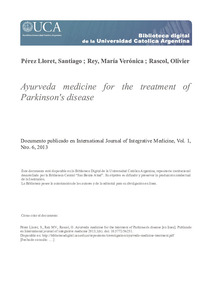Por favor, use este identificador para citar o enlazar este ítem:
https://repositorio.uca.edu.ar/handle/123456789/1622| Campo DC | Valor | Lengua/Idioma |
|---|---|---|
| dc.contributor.author | Pérez Lloret, Santiago | es |
| dc.contributor.author | Rey, Verónica | es |
| dc.contributor.author | Rascol, Olivier | es |
| dc.date.accessioned | 2019-05-02T14:01:09Z | - |
| dc.date.available | 2019-05-02T14:01:09Z | - |
| dc.date.issued | 2013 | - |
| dc.identifier.citation | Pérez Lloret, S., Rey M. V., Rascol, O. Ayurveda medicine for the treatment of Parkinson's disease [en línea]. International Journal of Integrative Medicine. 2013, 1 (6). doi: 10.5772/56251. Disponible en: https://repositorio.uca.edu.ar/handle/123456789/1622 | es |
| dc.identifier.issn | 1848-8846 | - |
| dc.identifier.uri | https://repositorio.uca.edu.ar/handle/123456789/1622 | - |
| dc.description.abstract | Abstract: Abstract In most western countries, the symptomatic management of Parkinson’s Disease (PD) is usually achieved with medicinal products including levodopa (LD), dopamine agonists, MAO‐B inhibitors, COMT inhibitors, antimuscarinics and amantadine. The control of the quality of the production of such medications is strict and the assessment of the benefit‐risk ratio of these interventions is regulated by official recommendations which follow an evidence‐based approach. Ayurveda Indian medicine has used Mucuna Pruriens (MP) for the treatment of PD since ancient times. MP includes LD as an active moiety, among many others. A literature search was conducted between 1978‐2012 with the keywords Parkinson’s disease, ayurveda or mucuna pruriens. MP antagonized the effects of 6OHDA lesions in rats and when administered chronically it showed lower dyskinetic potential compared to L‐DOPA. MP also reduced Parkinsonian symptoms in an MPTP treated monkey with less dyskinesias compared to L‐DOPA. Four clinical trials of MP for PD treatment were found. Initially they were open‐label, uncontrolled studies, suggesting that MP might reduce parkinsonism severity. One double‐blind randomized crossover study was conducted in 8 PD patients, employing acute challenges of levodopa or MP. It showed that the effect of MP had a faster onset than LD, with shorter latencies to peak and increased on‐time. No other medium‐term (i.e., 6 months) randomized‐controlled trials (RCT) are available. According to the MDS EBM taskforce working procedures, an intervention is considered as “efficacious” when there is at least one high quality randomized controlled trial (RCT) showing a positive effect on studied outcomes with no conflicting data from other RCTs. Based on these premises, there is insufficient evidence to conclude the efficacy of MP in the treatment of PD. Thus its use in clinical practice remains open to investigation. It must also be emphasized that various MP formulations can be used, raising concerns about their quality, which is difficult to control, as regulation is limited. Impurities or variations in active moieties, can lead to unexpected adverse drug reactions. In conclusion, the use of MP in PD treatment remains open to investigation and thus cannot be recommended for clinical use | es |
| dc.format | application/pdf | es |
| dc.language | eng | es |
| dc.language.iso | eng | es |
| dc.publisher | InTech | es |
| dc.rights | Acceso Abierto | es |
| dc.rights.uri | https://creativecommons.org/licenses/by-nc-sa/4.0/ | es |
| dc.source | International Journal of Integrative Medicine 2013, 1 (6) | es |
| dc.subject | MEDICINA AYURVEDA | es |
| dc.subject | ENFERMEDAD DE PARKINSON | es |
| dc.subject | TRATAMIENTO | es |
| dc.subject | ENFERMEDADES NEUROGENERATIVAS | es |
| dc.title | Ayurveda medicine for the treatment of Parkinson's disease | es |
| dc.type | Artículo | es |
| dc.identifier.doi | 10.5772/56251 | - |
| uca.path | Facultad de Ciencias Médicas|Departamento de Docencia e Investigación | es |
| uca.disciplina | MEDICINA | es |
| uca.filename | /home/data-uca-generic/folder_generic/IIBiomedicas/ayurveda-medicine-treatment/metadata.xml | es |
| uca.issnrd | 1 | es |
| uca.affiliation | Fil: Pérez Lloret, Santiago. Universidad de Toulouse III. Hospital Universitario. Departamento de Farmacología Clínica y Neurociencias; Francia | es |
| uca.affiliation | Fil: Pérez Lloret, Santiago. Pontificia Universidad Católica Argentina. Facultad de Medicina. Laboratorio de Clínica Farmacológica y Epidemiología; Argentina | es |
| uca.affiliation | Fil: Rey, Verónica. Universidad de Toulouse III. Hospital Universitario. Departamento de Farmacología Clínica y Neurociencias; Francia | es |
| uca.affiliation | Fil: Rey, Verónica. Pontificia Universidad Católica Argentina. Facultad de Medicina. Laboratorio de Clínica Farmacológica y Epidemiología; Argentina | es |
| uca.affiliation | Fil: Rascol, Olivier. Universidad de Toulouse III. Hospital Universitario. Departamento de Farmacología Clínica y Neurociencias; Francia | es |
| uca.version | publishedVersion | es |
| item.fulltext | With Fulltext | - |
| item.languageiso639-1 | en | - |
| item.grantfulltext | open | - |
| crisitem.author.dept | Laboratorio de Neurobiología Molecular | - |
| crisitem.author.dept | Consejo Nacional de Investigaciones Científicas y Técnicas | - |
| crisitem.author.orcid | 0000-0001-9069-6512 | - |
| crisitem.author.parentorg | Instituto de Investigaciones Biomédicas - BIOMED | - |
| Aparece en las colecciones: | Artículos | |
Ficheros en este ítem:
| Fichero | Descripción | Tamaño | Formato | |
|---|---|---|---|---|
| ayurveda-medicine-treatment.pdf | 389,39 kB | Adobe PDF |  Visualizar/Abrir |
Visualizaciones de página(s)
1.134
comprobado en 30-abr-2024
Descarga(s)
917
comprobado en 30-abr-2024
Google ScholarTM
Ver en Google Scholar
Altmetric
Altmetric
Este ítem está sujeto a una Licencia Creative Commons

